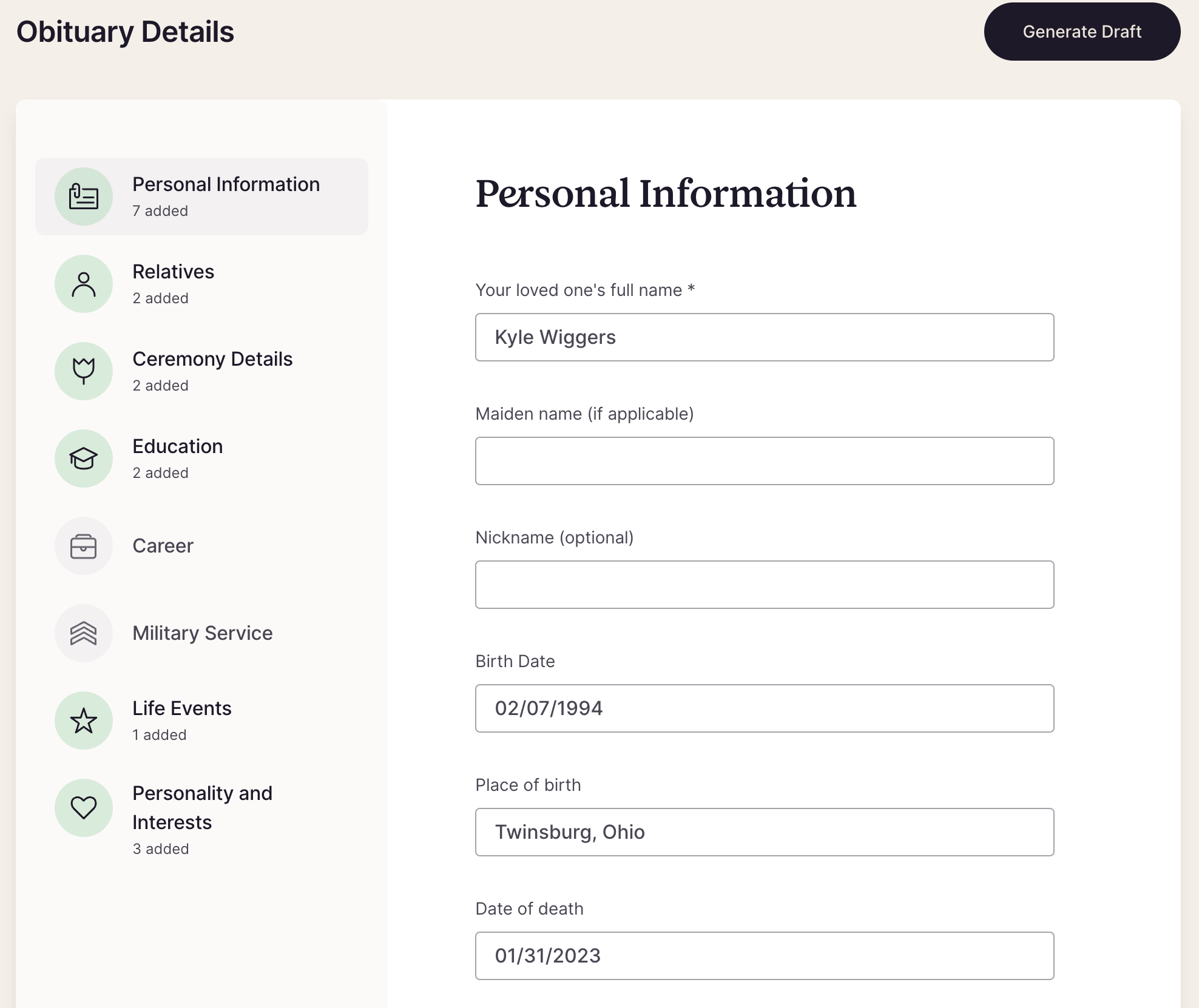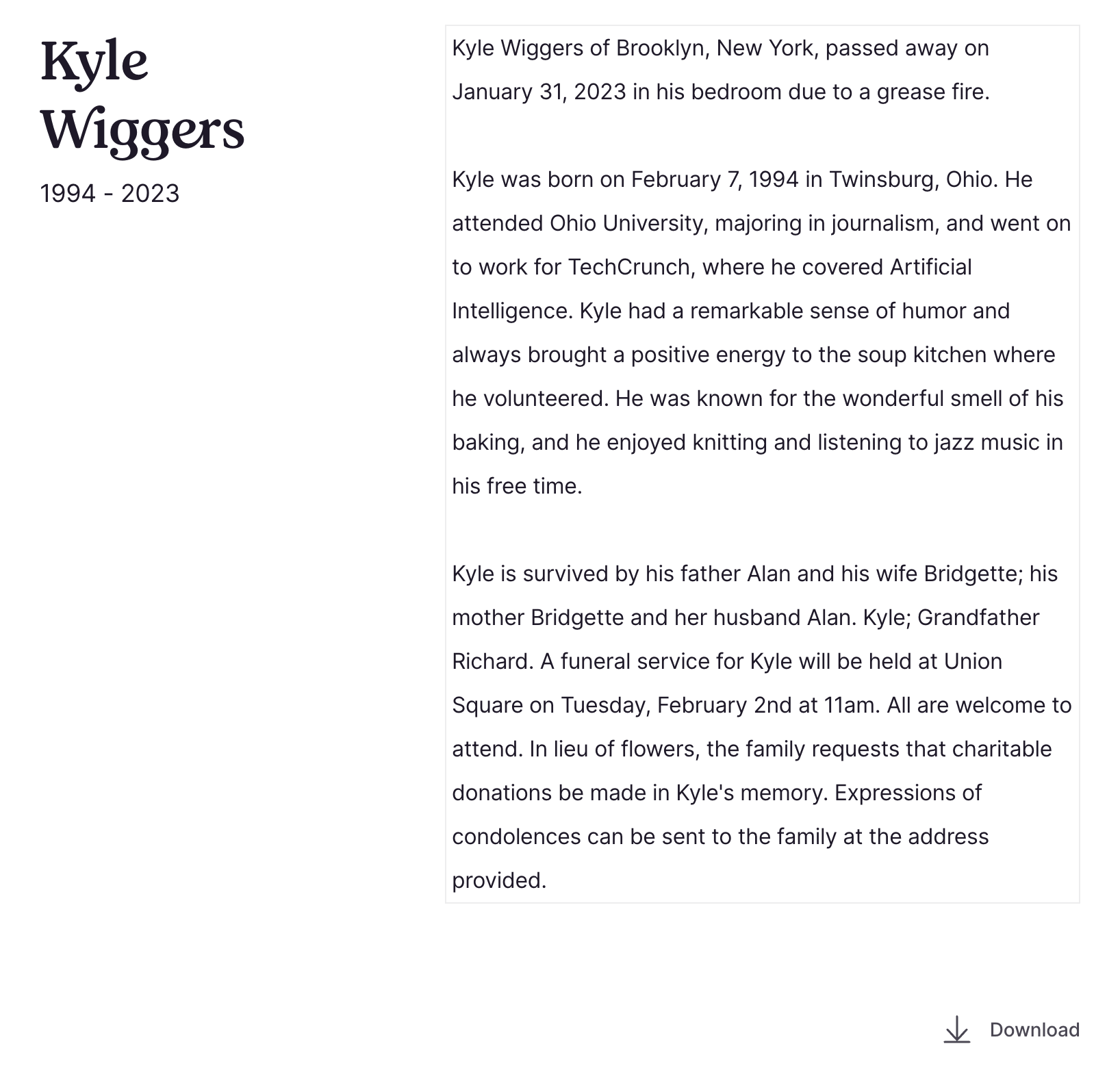Writing an obituary is not an easy task. To put it mildly – it’s incredibly painful, usually expensive too. But someone has to.
Or maybe not. Consider leaving it to the AI.
That’s the talk of Empathy, a platform that provides support to families who have recently experienced loss, with the launch of its new tool that uses AI to create obituary drafts. Called Find Words, the tool generates obituaries from basic information provided by family members.
“With the overwhelming number of tasks and emotional strain grieving families face, Finding Words allows them to worry less about the task of writing the text of an obituary and focus more on honoring the memory and of the legacy of their loved one,” the company wrote to me. in an introductory email.
But not everyone would agree. Offloading the work of writing an obituary onto the AI doesn’t sound particularly sensitive, at least to my ears. Wouldn’t the family want to get more involved in writing a memento of a loved one’s life? Doesn’t letting the AI handle the work somehow devalue it, or seem less thoughtful?
I asked Empathy CEO Ron Gura.
“Many people who experience the loss of a family member find it difficult to write personal, thoughtful tributes for their loved ones, for a variety of reasons,” he told me in an email interview. “They may be too emotionally overwhelmed to know where to start or preoccupied with the huge volume of administrative tasks that typically follow a disaster. It’s a terrible feeling to sit in front of your computer staring at a blank screen and feel like you’ve let your family and loved one down. Any support that can guide people through this process is beneficial, and it is essential that access to such support is democratized and made available to as many people as possible; generative AI serves as an equalizer in this regard.
These are fair points. So, in the interest of giving Find Words a chance, I plugged in some dummy information and had the tool write an obituary for me. (Cause of death: grease fire. Pretty plausible in New York, I thought.)

Feed Finding Words data to power its algorithms.
The tool guides you through a questionnaire, serving up prompts like the name of the deceased, date of birth, date of death, place of death, and last city of residence. Some questions are more specific, such as “Share all relevant details about the ceremony location, date and time, or special instructions”, and relate to different aspects of the person’s life, such as whether they served in the military, what people have often said about it, their proudest accomplishments, and your favorite memories together.
Most questions do not need to be answered and answers can range from a few words to several paragraphs. Gura says the stream was modeled after obituary writing services commonly offered by funeral homes and professional obituary writing companies.
“With Finding Words, Empathy empowers individuals by helping them work through this process themselves – and offers the service for free,” he added. “The tool helps people understand what is typically included in an obituary and prompts users to consider the kind of details, memories and anecdotes that are essential to writing a personalized obituary, ultimately elaborating the details captured in a coherent text.”
The Finding Words obituaries may not win awards, but they were frankly better than I expected (certainly compared to ChatGPT attempts). While I kept the prompt answers fairly relatively and non-specific in my test, the AI managed to turn them into something cohesive – if a bit formulaic. (To be fair, most obituaries are formula – so much so that a quick Google search turns up dozens of models.) If I hadn’t been told, I doubt I would suspect the AI played a role in the writing process.
Generative AI, including the type of text-generating AI that underlies Find Words, tends to generate false or otherwise problematic text. I did not observe any during my tests. But for the sake of rigor, I asked Gura what preventive measures Empathy had taken, if any.
“Finding Words is powered by an AI algorithm trained and refined by Empathy’s team of developers, writers, and grief professionals and is based on information from thousands of obituary samples…Our model d’IA has been trained to generate a consistent result that accurately reflects all the details of users’ input,” said Gura. “We take care to inform users that the text generated by Finding Words is fully automated and advise read the text carefully to verify that all the information is correct.”

The finished AI-generated obituary.
Will finding words make obituary writing services obsolete? I doubt it – these services tend to be more bespoke. But while I was tempted to dismiss it out of hand, I can’t say it wasn’t usable in my brief test. (Sorry to be the bearer of bad news, career obituary writers.) With a few tweaks, the results could be quite good, in fact – and certainly on par with some of the templates available (and the obituary written by the Wired AI in 2016 for Marvin Minsky).
Given the plagiarizing inclinations of generative AI, however, I am suspicious of how Empathy trains the language algorithm that powers word search. Gura didn’t reveal where the aforementioned sample obituaries came from, nor did it say whether Empathy uses user data to refine them. (I sent a follow-up email to clarify.) In any case, whether or not the creators of the training data are fairly compensated (and properly informed), Empathy – which is backed by a company, with 43 million dollars raised to date – is undoubtedly under pressure from investors to monetize. I wouldn’t be at all surprised to see a fee attached to Find Words in the future, in which case the tool will warrant further investigation.
“In terms of our projects to Discovery Wordswe are constantly collecting user feedback, reviewing each obituary generated, and regularly adjusting our templates and prompts to improve the quality of our obituary projects,” Gura said.
